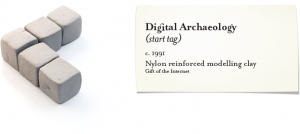 An exhibition on the history of the Web and Web design will run in New York this month.
An exhibition on the history of the Web and Web design will run in New York this month.
The exhibition, Digital Archaeology, debuted at Internet Week Europe 2010 and “charts the disruptive moments of web design and celebrates the characters behind its radical evolution“.

The Project
The exhibition will show case 28 important Web sites including: The Project – the first website, published by Tim Berners-Lee at CERN in 1991, and Word.com – One of the earliest and most influential e-zines, a true multimedia experience, incorporating games, audio, and chat.
An introduction to the exhibition explains…
“The web is just 20 years old, yet it has transformed our lives utterly, down to the bone. We do, see, hear, share, copy, sell, buy, interact, relate with authority and participate in society differently. Things will never be the same again. Over this short time, technological and communications developments have been so fast that the groundbreaking work of the early creative pioneers, produced on now defunct hardware and software, have disappeared almost as soon as they appeared, like Mayflies in spring doomed to die as the daylight fades.
Soon we will know less about these HTML blossomings than we do about the relief carvings in Mohenjo-Daro or the Yucatán. While they helped define our new culture, almost none of the websites of less than two decades ago can be seen at all. Today, when almost a quarter of the earth’s population is online, this most recent artistic, commercial and social history is being wiped from the face of earth and a hundred million hard drives lie festering in recycling yards or rusting in landfills.”
In his article on the exhibition entitled Internet history is vanishing into thin air Allan Hoffman asks:
“Does your company have a working, surfable copy of its first website or the second or third versions? Probably not. But if your company published an annual report or even a newsletter in 1954 or 1999, you can bet someone saved it, and you could dig up a copy.“
It seems Web preservation has at last hit the mainstream.
